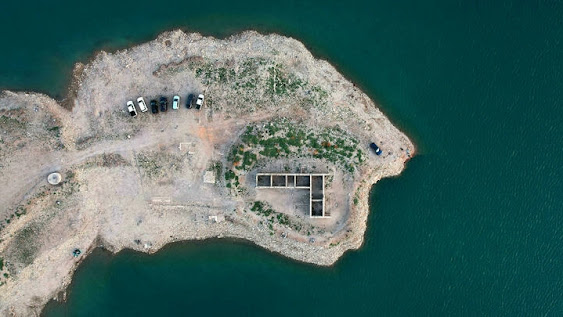Issued on: 05/11/2021 -
Dohuk (Iraq) (AFP) – The ruins of an Iraqi Kurdish village abandoned 36 years ago and submerged under the waters of a dam, have suddenly resurfaced thanks to sinking water levels in the drought-hit country.
The construction of the dam, two kilometres (one mile) north of the town of Dohuk, started in 1985 and prompted the resettlement of Guiri Qasrouka's 50 families.
Guiri Qasrouka was then swallowed by the waters which serve to irrigate surrounding farmland.
"Because of the drought" caused by scant rainfall in Iraq, the Dohuk dam's water level dropped by seven metres (23 feet) in September and brought the village back to the surface, explained the dam's director, Farhad Taher.
"This phenomenon is certainly linked to climate change," Taher said, adding that the ruins had also reappeared in 2009, 1999 and 1992.

People visit the remains of the village, which has also reappeared three times previously when surrounding dam waters dropped sharply Ismael ADNAN AFP
Before the winter rains set in and the village goes under again, visitors on foot can now view the stone walls of a Guiri Qasrouka home that is still standing.
The algae-splattered and shell-indented ruins are set against a backdrop of the towering Kurdish mountains of northern Iraq.
With financial compensation, villagers, who had also fled between 1974 and 1976 during a Kurdish uprising, built a new Guiri Qasrouka nearby.
© 2021 AFP


























